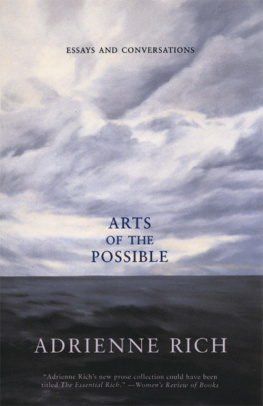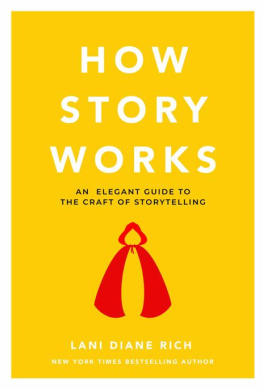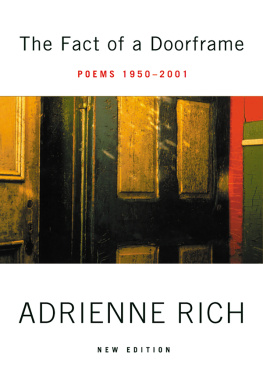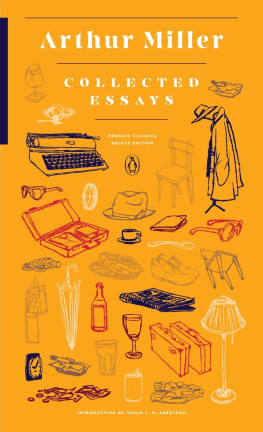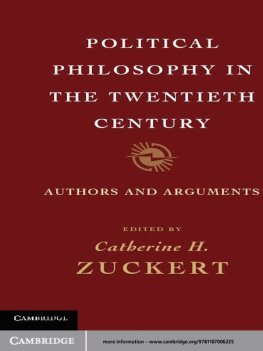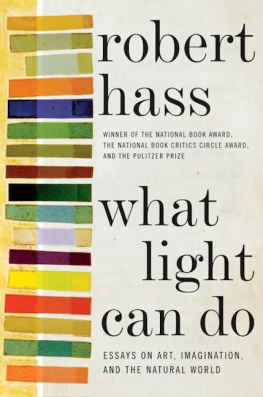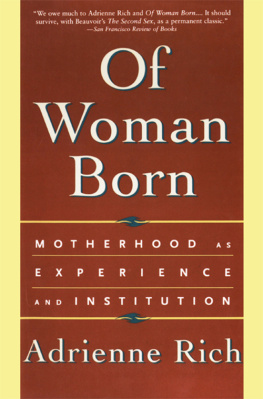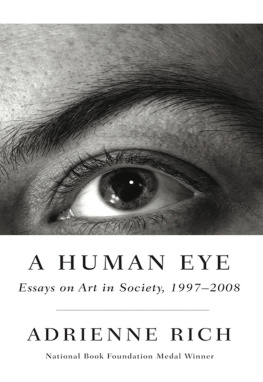
Copyright 2001 by Adrienne Rich
All rights reserved
First published as a Norton paperback 2002
For information about permission to reproduce selections from this book,
write to Permissions, W. W. Norton & Company, Inc., 500 Fifth Avenue,
New York, NY 10110
Book design by Antonina Krass.
Stenciled book ornament by William Addison Dwiggins.
The Library of Congress has cataloged the printed edition as follows:;
Rich, Adrienne Cecile.
Arts of the possible: essays and conversations/Adrienne Rich,
p. cm.
Includes index.
1. Rich, Adrienne CecileInterviews. 2. Poets, American20th century Interviews. 3. PoetryAuthorship. 4. Poetry. I. Title. PS3535.I233 A83 2001
811.54dc21
[B] 00-051522
ISBN 978-0-393-32312-2
ISBN 978-0-393-34573-5 (e-book)
W. W. Norton & Company, Inc., 500 Fifth Avenue, New York, NY 10110
www.wwnorton.com
W. W. Norton & Company, Ltd., Castle House, 75/76 Wells Street, London
W1T 3QT
For my grandchildren
Julia and Charlie

For some readers, the first four essays in this volume may seem to belong to a bygone era. I include them here as background, indicating certain directions in my thinking both about poetry and about the society in which I was writing twenty to thirty years ago. A burgeoning womens movement in the 1970s and early 1980s incited and provided the occasions for them, created their ecology. But, as I suggested in Notes toward a Politics of Location, my thinking was unable to fulfill itself within feminism alone.
Our senses are currently whip-driven by a feverish new pace of technological change. The activities that mark us as human, though, dont begin, exist in, or end by such a calculus. They pulse, fade out, and pulse again in human tissue, human nerves, and in the elemental humus of memory, dreams, and art, where there are no bygone eras. They are in us, they can speak to us, they can teach us if we desire it.
In fact, for Westerners to look back on 1900 is to come full face upon ourselves in 2000, still trying to grapple with the hectic power of capitalism and technology, the displacement of the social will into the accumulation of money and things. Thus (Karl Marx in 1844) all physical and intellectual senses [are] replaced by the simple alienation of all these senses, the sense of having. We have been here all along.
In selecting a few essays from my earlier work for this collection, I sometimes had a rueful sense of how one periods necessary strategies can mutate into the monsters of a later time. The accurate feminist perceptions that womens lives, historically or individually, were mostly unrecorded and that the personal is political are cases in point. Feminism has depended heavily on the concrete testimony of individual women, a testimony that was meant to accumulate toward collective understanding and practice. In When We Dead Awaken, I borrowed my title from Ibsens last play, written in 1900. Certainly the issues Ibsen had dramatized were very much alive. I used myself to illustrate a woman writers journey, rather tentatively. In 1971 this still seemed a questionable, even illegitimate, approach, especially in a paper to be given at an academic convention.
Soon thereafter, personal narrative was becoming valued as the true coin of feminist expression. At the same time, in every zone of public life, personal and private solutions were being marketed by a profit-driven corporate system, while collective action and even collective realities were mocked at best and at worst rendered historically sterile.
By the late 1990s, in mainstream American public discourse, personal anecdote was replacing critical argument, true confessions were foregrounding the discussion of ideas. A feminism that sought to engage race and colonialism, the global monoculture of United States corporate and military interests, the specific locations and agencies of women within all this was being countered by the marketing of a United States model of femaleor feminineself-involvement and self-improvement, devoid of political context or content.
Still, those four early essays suggest the terrain where I started: a time of imaginative and intellectual ferment, when many kinds of transformations seemed possible. Women and Honor belongs to a period when there was in the air a theoretical code of ethical responsibility among women: a precarious solidarity of gender. Within that ethicwhich I sharedI was trying to criticize the deceptions we practiced on each other and ourselves. Published at a time of vigorous feminist small-press pamphleteering, Women and Honor seemed, for a while, usable. Today, the parts that most interest me are the descriptions of how lying can disrupt the internal balance of the one who accepts the lie, and the difficulties of constructing an honorable life. I believe these stretch beyond gender to other hoped-for pacts, comradeships, and conversations, including those between the citizen and her government. (I do not believe that truth-telling exists in a bubble, sealed off from the desire for justice.)
Looking back on her own earlier writings, Susan Sontag has remarked: Now the very idea of the serious (and the honorable) seems quaint, unrealistic, to most people. Like other serious and vibrant movements, feminism was to be countered by cultural patterns unforeseen before the 1980s: a growing middle-class self-absorption and indifference both to ideas and to the larger social order, along with the compression of media power and resources into fewer and fewer hands, during and beyond the Reagan years.
It interests me that in Women and Honor, that poetically terse piece of writing, I first invoked the name of Marxto dismiss Marxism for women. I was of course echoing the standard anti-Marxism of the postwar American cultural and political mainstream. But, as I indicate in Raya Dunayevskayas Marxwritten more than a decade laterthis anti-Marxism, uncriticized and uninvestigated, was present also in the womens movement. Marxism was tainted there, both by garden-variety anticommunism and by the fear that class would erase gender once again, when gender was just beginning to be understood as a political category.
Sometime around 1980 I felt impelled to go back and read what I had dismissed or felt threatened by: I had to find out what Marx, along the way of his own development, had actually written. I began working my way through those writings, in the assorted translations and editions available to me, an autodidact and an outsider, not an academic or post-Marx Marxist. There were passages that whetted my hunger; others I traversed laboriously and in intellectual fatigue. I understood that I was sometimes overhearing early nineteenth-century German philosophical diatribes I could just as well skip.
What kept me going was the sense of being in the company of a great geographer of the human condition; and, specifically, a sense of recognition: how profit-driven economic relations filter into zones of thought and feeling. Marxs depiction of early nineteenth-century capitalism and its dehumanizing effect on the social landscape rang truer than ever at the centurys end.
Along with that flare of recognition came profound respect and empathy for Marxs restless vision of human capacities and the nature of their frustration. I found no blueprint for a future utopia, but a skilled diagnosis of skewed and disfigured human relationships. I found a Marx who would have been revolted by Stalinism, by the expropriation of his ideas in the name of tyranny, by the expropriation of his name: I am not a marxist, he said.
Next page
